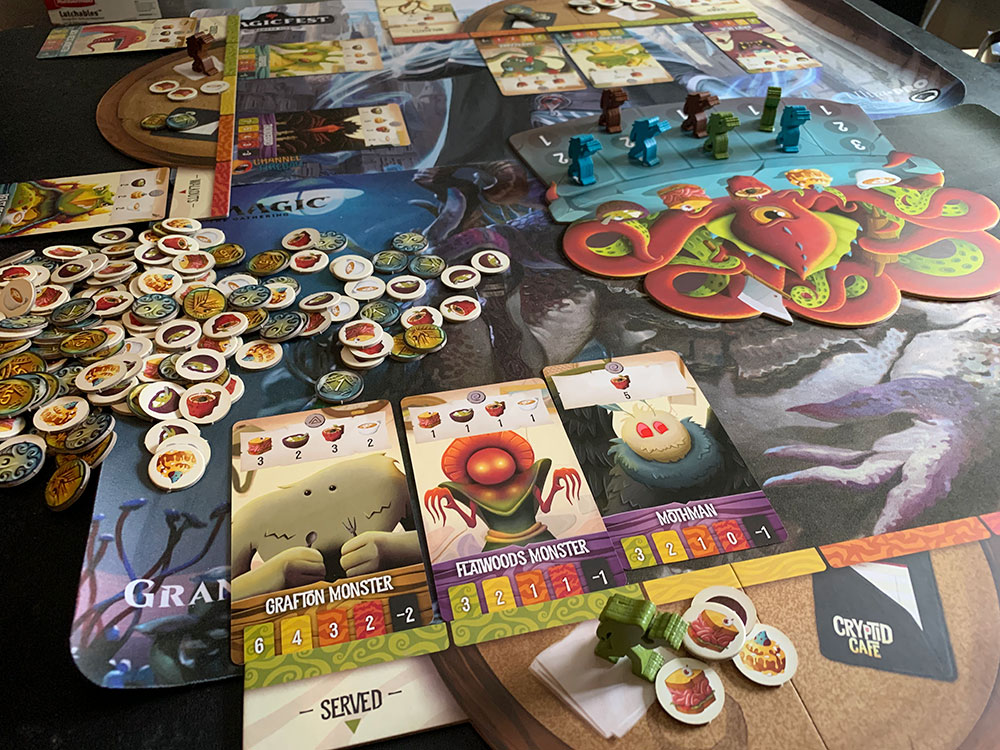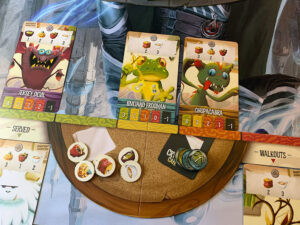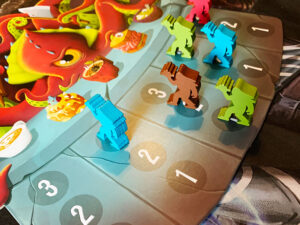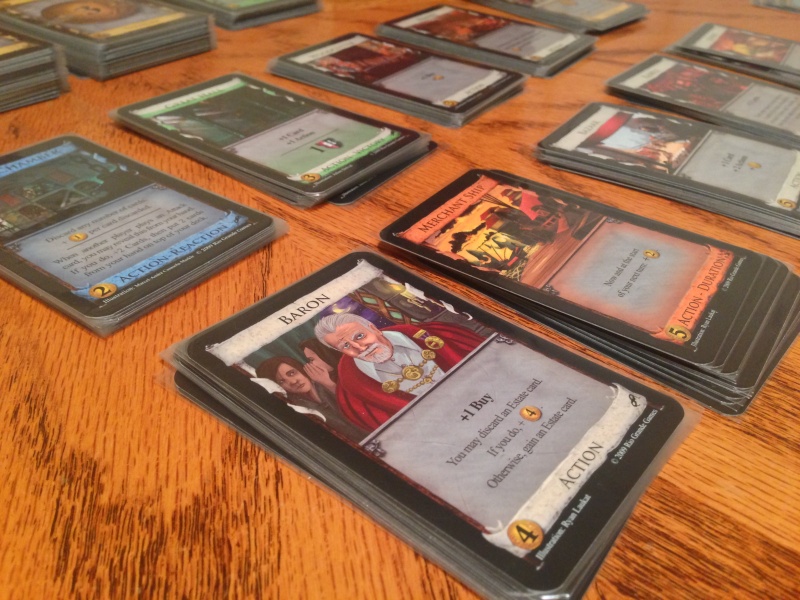 Generally, I like cooperative games, and I also have a tendency to focus on games based on intellectual properties that I enjoy. As a lover of theme, I like seeing how things I am already familiar with are implemented in a game. Sometimes though, I see a game that just by the cover of it I feel like I need to try because it just looks unique. That’s the case with Cryptid Cafe.
Generally, I like cooperative games, and I also have a tendency to focus on games based on intellectual properties that I enjoy. As a lover of theme, I like seeing how things I am already familiar with are implemented in a game. Sometimes though, I see a game that just by the cover of it I feel like I need to try because it just looks unique. That’s the case with Cryptid Cafe.
Definitely not a game I would have sought out if the opportunity had not been presented to give it a try. It is a game for 1-4 players, with some slight alterations to make it work at lower player counts. It plays relatively quickly at about 30 minutes or so. The best experience is with 3-4 players.
Gameplay Overview:
In Cryptid Cafe, each player is a sasquatch server at the café, attempting to please as many of their monster customers as possible. It has elements of worker placement and resource collection. Overall, the flow of the game is very simple and easy to execute. Your ultimate goal is to be the server with the most tips at the end of the night. Each round is broken down into four simple phases.

The first (and, I would say, primary) phase is placing your server meeples in line at the chef, trying to get certain foods to fulfill your customers’ orders. There are five types of food that your customers may be requesting in various amounts: Al-bone-digas soup, BLTE sandwiches, Cinnamonsters rolls, Hexpressos, and Hot Apple Spiders. You take turns placing your sasquatch servers in line at the Kraken chef to get the food that you need, with those at the front of the line getting more food than those at the back. Simple enough.
It gets trickier in the second phase, when you can essentially bribe the chef to move yourself farther forward in line, bumping those in front of you back, before the chef hands out the food to the servers. The third and fourth phases are relatively quick. You can spend food you’ve collected from the chef to fulfill customer orders and get tipped, and then clean up to prepare for the next round. It’s all pretty easy and you get the hang of it after the first round or two.
Your choices are made primarily on the Kraken chef board that the players share, but they’ll be based on the needs in regard to your individual player boards. Each player has their own customer deck that they will draw from throughout the game, placing their customers above their player board, and slowly moving them to the right as they wait longer for their food. The farther to the left they are on your board, the bigger the tip you receive when they are served. The farther to the right they are, the smaller the tip, until they get fed up and walk out.

Game Experience:
As I mentioned, the gameplay here is not too complex. You do have choices to make, because you will often need more types of food than you have servers to collect food with. You only ever get three servers, and some customers will want four or even five different kinds of food. Additionally, you can only collect the same type of food once per round, and some customers want four or more of a single type of food, which cannot be done immediately. As a result, there are actually a number of things to consider when you are placing your server. It’s almost like triage to a degree. What do you absolutely need right now versus what can wait to be finished for another round? Will this customer walk out if I don’t deal with them immediately? That sort of thought process.

However, there is a degree of player interaction, particularly at 3 or 4 players. What foods your customers are asking for is open information (if your opponents take the time to look!). It isn’t necessarily as simple as “I need 3 Hexpresso so I will place myself in front of the line and call it a day.” With the tip-sharing with the chef (a.k.a. bribing), it’s very easy to disrupt your plans by bumping you back a space and taking your place. Since you can only bribe the chef if you are last in line (provided there is at least one server in front of you), it’s a possibility that you have to consider. It can be safer to put yourself farther back in line, though it will cost you a little money to the chef! Additionally, spaces are limited. There are only three spots in line for each food type, so in a four-player game, the board gets a bit crowded with servers. You can get blocked out of a certain food type very quickly. The simplicity of the mechanics conceals that there is this more complex decision-making process.

The meat of the game is primarily the worker placement aspect in the first phase. The second phase’s player interaction is certainly very relevant and important, but the third and fourth phases are more housekeeping and fly by. Most of your decisions really get made in that first phase. Once your servers are placed, you’ve likely already made your decisions about whether or not you will bribe the chef before collecting food in the second phase or not.
The game functions best with 3 or 4 players. Once you reduce the player count to 1 or 2 players, there are “A.I.” decks that are introduced which will tell you where to place competing servers, in combination with a six-sided die that tells you which spot in line they will take and whether or not they will bribe the chef, if able. It’s a bit of extra busy-work that does get the job done and make it playable with lower player counts but does not quite end up with the same feel as a fuller game of 3-4 players.
The last elements that are available at all player counts are the specialty cards and events. The former (Manager and Change My Order) are once-per-game effects that can help you out of tough situations. They are interesting at 3 and 4 players but feel less relevant in the smaller player counts again. The latter are cards that are in your customer deck that might come up instead of customers to throw a wrench into your plans, preventing you from ordering a certain food type for that round.
Final Thoughts:

The real highlight of Cryptid Cafe is its simplicity. It is really easy to explain and pick up. What you want to do is easy to understand. The basics of how you do it are also easy to understand. The needs of your customers and the urgency of filling the orders of certain ones is readily apparent. The boards are designed to not take up too much space and convey the game state very clearly. All of this adds up to a game that’s easy to introduce to a group that just wants something fun and quick to do.
The ease of bumping players back with the chef bribes felt like it was a bit much. With any worker placement game (that is well designed), there is already the built-in player interaction of competing for spaces, which is present here. The additional benefit to actually being last in line instead of first does elevate that player interaction, but it did not always feel like that was a positive. Since it was relatively cheap to do, it happens quite often, creating situations where frequently putting yourself in the last spot is the right decision. This could be viewed as a positive, but I think it made the player interaction a bit too much or at the very least too easy.
That said, I think Cryptid Cafe is a nice light game for those that don’t dig too deep into it and just want a little fun. Many elements of it are well designed. The Specialty cards give you nice “ah ha” moments when things don’t quite go the way you’d hoped, and even the Event cards, while potentially a little frustrating, switch up the gameplay a little so it doesn’t get repetitive or stale. Responding to adversity and overcoming it is an important part of games in general.
This game is worth giving a shot if you are looking for a quick and easy 3-4 player competitive game without too many bells and whistles. If you don’t like a lot of overt player interaction, this one is probably not for you, though it’s fast-paced enough to likely still be enjoyable. I probably would not recommend it as a Solo game, other considerations aside. It definitely works better with real opponents.
Final Score: 3 Stars – A light and fun game that plays nice and quickly, but can be a little frustrating with the potential amount of player interaction.
 Hits:
Hits:
• The art and presentation here is great. The various monster customer cards are fun to see when they come up.
• Really easy to explain, learn, and play.
• Enough elements are included that switch things up so the game does not get repetitive too quickly.
Misses:
• The worker placement can be counterintuitive when combined with the ability to force your way ahead in line being cheap and easy to do.
• The A.I. deck and die for Solo and two-player work but are a little tedious and do not maintain the feel of playing against a real player very well.
• For a game that is mostly very simple, the end game scoring, particularly in Solo, is a bit math-y.






















